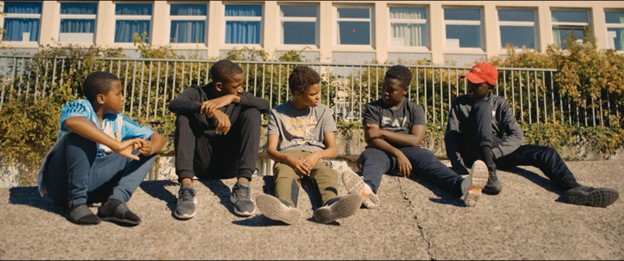…Now, literally all I want is to be hot and famous. I want power. Not power over people, but the power to act, to provoke desire that expands my capacity to live. This is not the lesson I’m supposed to learn, but I’ve always learned everything, including my lessons, a little askew. If someone were to say, what has living your life like this gotten you so far?, haven’t you always been like this, even before your transition, in one way or another?, I could only say that it’s led me to dark and beautiful places. Sometimes I wonder if there’s something wrong with me on a spiritual level: for instance, don’t I need a little Hierophant in my life, an internal structure, a system even? But I’ve never been able to fit myself into a structure, a system. Maybe that’s the Capricorn in me. I don’t care about astrology, but I like any spiritual idea in which the universe is speaking about me, or in which I am speaking the universe.
Culturewatch
There were things that happened
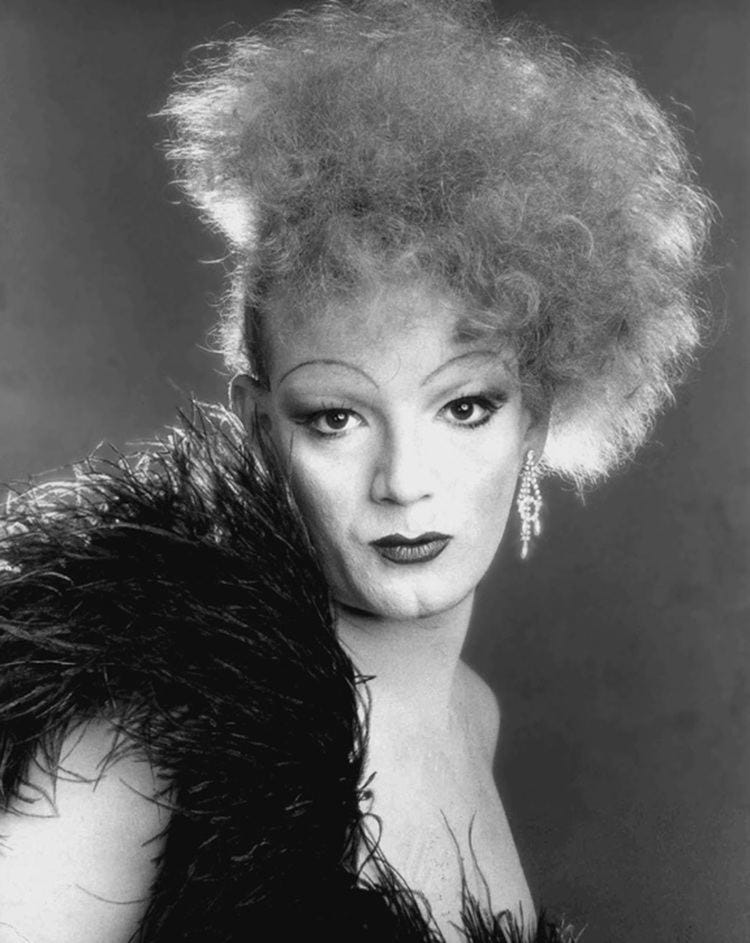
Jackie Curtis
In 1970, my apartment, four rooms on the 6th floor of a building on 12th Street and Avenue B overlooking a fried chicken joint everyone called Nodders, because junkies, whose habits made them crave sugar and salt, would hang out there during the day, nodding out over paper plates of fried chicken and cups of Coke. The place didn’t have a bathroom because the owner, an old Greek guy who wore a white shirt and a white apron and a chef’s toque, got tired of dragging overdose cases out of the single stall and calling the cops. He didn’t get rid of the nodders, however. They made up more than half his business.
I furnished the place completely off the street.
Standards (& Stadiums)
Stanley Corngold’s evocation of his first time in Yankee Stadium reminded your editor of a Q&A with another Brooklyn boy (and friend of First). When the late Jules Chametzky was in hospice last year his son, Rob, asked him if he’d ever seen Willie Mays play when Mays was in the minor leagues. Rob recalled their exchange at his father’s Memorial…
Chasing Kareem…Becoming Kareem
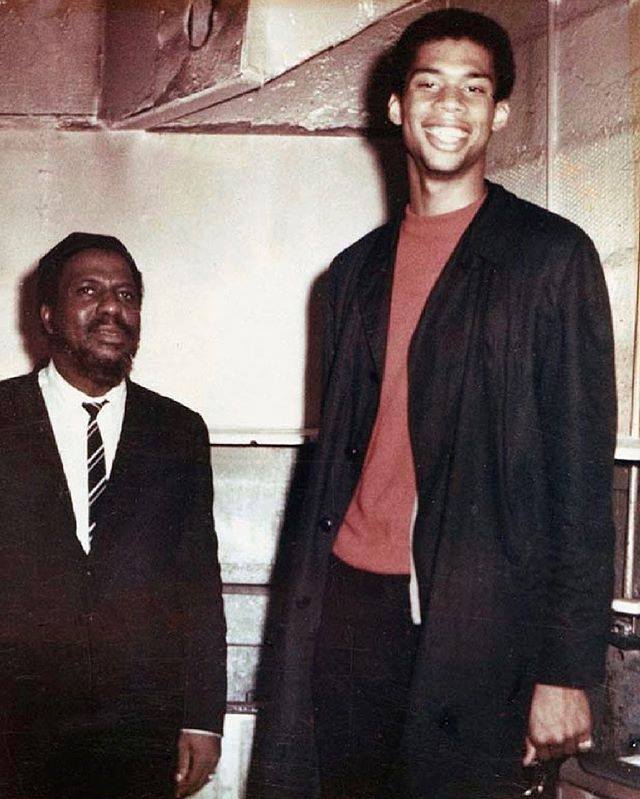
Thelonious Monk with 18-year-old Lew Alcindor (soon to be Kareem Abdul-Jabbar) in the kitchen of the Village Vanguard, New York City, March 1966. Photo by the Baroness Pannonica de Koenigswarter.
Happy Valentine’s Day
[an excerpt from something new]
.. Yesterday, before heading over to Amal’s to get tattooed, I sent an email to Heidi that contained an email address, a password, and the contact info of three people: Benj (who’s been my editor at First of the Month since I started out as a writer), Mike, and Rebecca. I don’t mean to be morbid, I said, but I want you to have access to the account. It’s where I’m going to be sending my unpublished writing, the manuscript I’m working on, whatever I don’t release immediately into the world. If something happens to me, I want you to share the account details with these three people.
..It was one of those days where death seemed right around the corner, felt as certain as the ineluctable arrival of a new season (a secret winter within the heart of my summer), where everything felt like a prefiguration of death, a native language spoken by death, a whisper from somewhere else: from the void? Who the fuck knows?
This Met is Mine
Manhattan’s Just Above Midtown (JAM) gallery became a haven for Black Atlantic artists in the 70s and 80s. A current exhibit at MOMA chronicles work first shown at JAM and includes art by Lorraine O’Grady. The author of the following post was born long after JAM’s moment. He encountered O’Grady’s work on the campus of the University of Chicago. It launched him on a trip that took him back to the playful start of his own art-life…
I came across one of the sixteen diptychs that make up Lorraine O’Grady’s Miscegenated Family Album—(Cross Generational) L: Nefertiti, the last image; R: Devonia\’s youngest Daughter, Kimberley—in the the Booth collection.
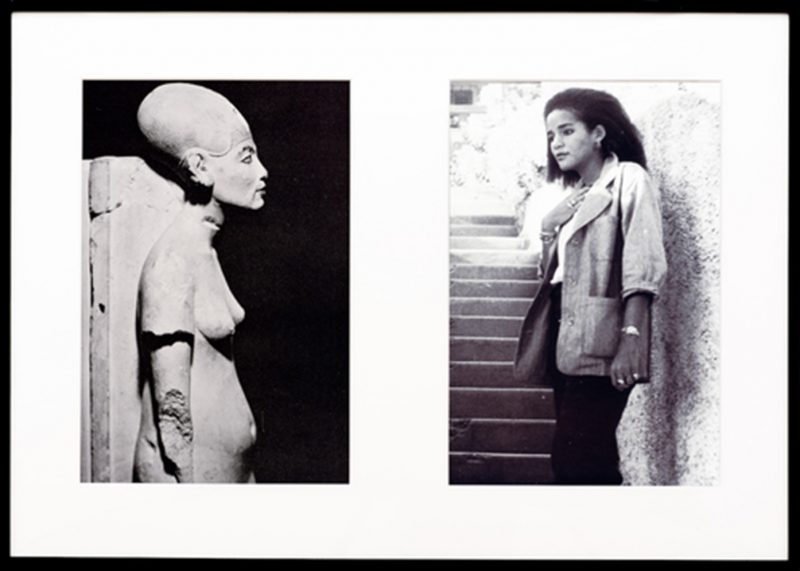
Action Painting (Redux)
Originally posted here in 2016.
Micro-aggressions have been on my mind lately. Easy for us white guys to dismiss, but when a cab doesn’t pick us up or someone confuses us with some other white guy they once met at a party, it doesn’t trigger an identification with the victims of 500 years of violence and oppression. We rarely take it personally. The key is identification, not identity, though it arises from identity.
The Organization Man: Franz Kafka, Risk Insurance, and the Occasional Hell of Office Life
Most readers know Franz Kafka as the reclusive author of stories and novels that have since become monumental works of modern literature. Some readers also know him as a bureaucrat who, unhappy in his office, castigated the “hell of office life.” But few know that he rose at the end of his life to the position of Senior Legal Secretary at the Workmen’s Accident Insurance Institute for the Kingdom of Bohemia in Prague (called, after 1918, the Workmen’s Accident Insurance Institute for the Czech Lands). Kafka was no Bartleby the Scrivener, no harmless office drudge. Rather, he was a brilliant innovator of social and legal reform in “the Manchester of the Empire,” which at the time of Kafka’s tenure, between 1908-1922, was one of the most highly developed industrial areas of Europe.
With These Hands
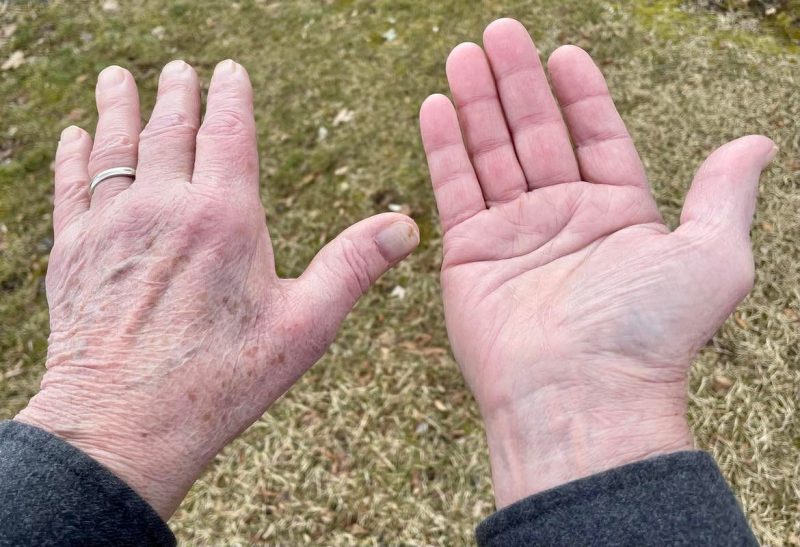
I was going to start with a question, whether it’s possible to be self-conscious about your hands, but of course the answer is yes.
Remember Clemente (Martín Espada and Richard Torres)
December 31, 2022 marked the 50th anniversary of Roberto Clemente’s death.
No Joke: Nikola and Golden State’s Mouthy Guards
Bob Liss linked your editor to the first video here after he’d written in praise of Nikola Jokic last month. Another First reader/writer, Rob Chametzky, passed on another shorter video-proof of Jokic’s physical genius. (See below.)
Days of Necrophilia
…The first time we talked on the phone, they said they wanted to lend me a book, the most precious book in their collection. I imagine myself as a wandering librarian in a traveling circus, they said, a dealer in literary esoterica, a peddler of the insanity of the written word. I used to deal drugs for the Hell’s Angels: this is a step up. Though when you’re a girl from Chico with a Nazi dad and a hippie sex worker mom, forced to deal acid outside the high school instead of actually going to the high school, pretty much everything is a step up. If you start in hell, then everything is possibility, a kind of miracle. You learn to read the world as a Gnostic book that hasn’t written you into the text yet, or that wrote you in a long time ago but in a way you can’t recognize, in a way you may never understand.
Soul on Film
European cinema “has still got it” per guest essayist Emilie Bickerton in last week’s Times.[1] Like her, I’m lifted by the prospect of new films by the Dardenne brothers and Mia Hansen-Love. Other films/directors she cites sound lively too. Yet Ms. Bickerton may have missed the most galvanizing French cinema of this moment. When a worldly friend heard I’d been to Paris last summer, he commended “wild” new movies based on life in banlieues on the edge of the city. (“You’ll want to head right back to see what you missed!”) The movies that moved him were made by filmmakers in Kourtrajmé (slang for “court métrage,” or “short film”)—a collective that includes Romain Gravas (son of Costa-Gravas) who has directed two fast and furiously French features, The World is Yours and Athena (both available now on Netflix). If you’re ready to catch Kourtrajmé’s New Wave, though, I’d start with Ladj Ly’s Les Miserables.
Tool of The People: Q&A with Ladj Ly
Les Miserables
Sight and Sound‘s Elena Lazic interviewed Ladj Ly soon after the UK release of Les Miserables in 2020.
Most people discovered you through Les Misérables, but you’ve been making films for a long time. Can you tell me about your work with the collective Kourtrajmé?
Kourtrajmé is, before anything else, a group of friends. We all grew up together. We’ve known each other since kindergarten or primary school.
The collective was formed in 1994 with the ambition to make our own films. I joined in 1996. I was close friends with Kim Chapiron as a kid. I started as an actor in his films, and then at 17, I bought my first video camera and began filming my neighbourhood.
Nowhere Else to Go
…The second-to-last night (the penultimate night on Earth), we were having dinner at their new place, the one we’d been trying to move into for months now. They showed me their books, their paintings (haunted self-portraits of a girl under water, or a girl lost in the dream of her own beauty, her own schizophrenia, an enclosed and infinite pain: but also they were no longer self-portraits, they were portraits of a dead girl, a girl who’d been dead for aeons, who’d escaped or gotten lost through a trapdoor in the basement of time, who’d…). They gave me jewelry to wear. I had a vision of the two of us, of future afternoons in the living room: languid afternoons, erotic afternoons in which nothing happens. They sang Leonard Cohen’s “I’m Your Man” for me (a prefiguration of their transition), serenading me, and afterwards they made me cum, fingering me vigorously and telling me what a whore I was, or am. This is all for my pleasure, they said. Your pleasure doesn’t matter. I moan. You’re just a fucktoy, a doll I bought at the store, you exist to be fucked, you’re pure sex and nothing else, you don’t have a soul, you don’t have a brain, you’re nothing but degraded lust, nothing but holes to be filled by so many cocks, a mouth to be used by so many pussies, a bimbo, a bitch, etc. They suck on my tits with a sexual hunger I’ve never seen before, and I explode.
Denise
a writer is [someone] for whom writing is more difficult than it is for others.
Thomas Mann
…..Inside the café, from left to right, 8:20 AM. Caucasian male, red hair, red beard, green sweater, in his 20s, working on a lap top. Asian woman, about 50, wide black-framed glasses, red quilted jacket, underlining in red a book about “Power.” Young Asian man, charcoal grey sweater, ear buds, working on his lap top. Indian/Pakistani male, 30-ish, horn-rimmed glasses, heavy white sweater, laptop. Caucasian man, 50-ish, grey hoodie over black racing cap, on his laptop too.
…..All silent.
…..All alone.
…..Working toward what they could not know.
…..
I am often interested in why people write and what it is they choose to write about.

